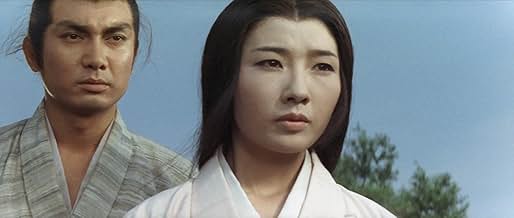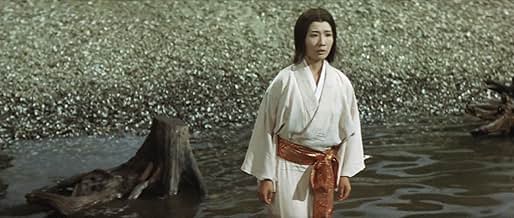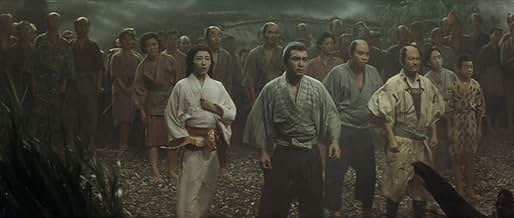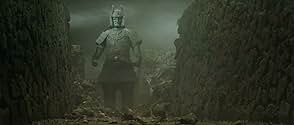IMDb-BEWERTUNG
6,4/10
1054
IHRE BEWERTUNG
Füge eine Handlung in deiner Sprache hinzuGiant statue exacts revenge upon those who conquer its worshippers.Giant statue exacts revenge upon those who conquer its worshippers.Giant statue exacts revenge upon those who conquer its worshippers.
Jutarô Kitashiro
- Genba Onikojima
- (as Jutarô Hôjô)
Empfohlene Bewertungen
This is the second installment of the Daimajin trilogy although the three stories are not connected.
Daimajin is a talismanic 50 ft stone statue embodied with the spirit of local god. It normally sits idle with a peaceful face, but when the people are oppressed, it wakes up and changes to fierce expression to protect the innocent.
The settings is in samurai era Japan. Country of Chigusa is invaded by the neighboring warlord of Mikoshiba. What the warlord of Mikoshiba doesn't know is that Chigusa is protected by Daimajin. He wreaks havoc on the people of Chigusa until - you guessed it - he pisses off the Daimajin !
Even seen as samurai movie, this movie has one of the best cinematography showing Daiei's experience in making samurai movies. Special effects are one of the best for '60s Japanese movie as well. Kojiro Hongo who was the star of '60s and '90s Gamera series also stars in this movie. Supporting casts are good too, and they deliver superb performance.
The movie is an interesting mixture of samurai and giant monster movie, but it works.
The recent TV mini-series "Daimajin Kanon" is a direct homage to this series and features the Daimajin in modern settings.
Daimajin is a talismanic 50 ft stone statue embodied with the spirit of local god. It normally sits idle with a peaceful face, but when the people are oppressed, it wakes up and changes to fierce expression to protect the innocent.
The settings is in samurai era Japan. Country of Chigusa is invaded by the neighboring warlord of Mikoshiba. What the warlord of Mikoshiba doesn't know is that Chigusa is protected by Daimajin. He wreaks havoc on the people of Chigusa until - you guessed it - he pisses off the Daimajin !
Even seen as samurai movie, this movie has one of the best cinematography showing Daiei's experience in making samurai movies. Special effects are one of the best for '60s Japanese movie as well. Kojiro Hongo who was the star of '60s and '90s Gamera series also stars in this movie. Supporting casts are good too, and they deliver superb performance.
The movie is an interesting mixture of samurai and giant monster movie, but it works.
The recent TV mini-series "Daimajin Kanon" is a direct homage to this series and features the Daimajin in modern settings.
Basically this is the "Daimajin" plot done with a few subtle differences. There are some interesting Christian motifs here; parting of the Red Sea, crucifixion... that I wasn't expecting being that Majin is a "kami". Visually it is very satisfying. Misumi went on to direct the incredible "Kozure Okami" or "Lone Wolf with Cub" movies. Daimajin has some interesting parallels with "King Kong". It's always a woman who ultimately commands the Majin with her prayers and tears.
Return of Daimajin is the second film in the trilogy about the great demon god that combines elements of period dramas and giant monster movies. In this shortest movie of the series, an evil lord menaces, destroys and conquers two neighbouring villages when farmers seek refuge from him in these peaceful places. The survivors of the invasion retreat to an island on a lake where Daimajin's statue is hidden in a cave. As the lord destroys the statue, the demon god comes to life to save the villagers from the murderous dictator.
This movie convinces on numerous levels and has aged very well. First and foremost, this film clocks in at only seventy-nine minutes and entertains from start to finish with swift pace.
Up next, the locations have been chosen particularly well and bring ancestral Japan back to life. The scenic mountains and fields, the colourful villages and fortifications as well as the mysterious island on the lake are quite memorable.
The characters are also very intriguing. The antagonist is particularly brutal, pitiless and selfish and will make viewers root against him. The protagonists shine with courage, perseverance and resilience and will make viewers empathize with them. Even the side characters have interesting emotional characteristics to offer. Needless to say that the skilled acting performances match the wonderful script.
The final twenty minutes of the movie are particularly spectacular. The titular monster goes on an impressive rampage as the simple yet efficient special effects shine brightly in this movie. The architecture of the villages, the armour of the monster and the costumes of the villagers have all been crafted with great detail. The destruction of infrastructures looks impressive and has been prepared very skillfully and filmed very precisely.
The technical aspects of this movie are very strong in general. Even decades later, the calm, organized and precise camera work stands out very positively if compared to numerous action movies with dizzying shaky camera sections. The authentic, detailed and intense sound effects in the destructive finale will send shivers down the spine of any cineast. The excellent classical music soundtrack by skilled veteran Ifukube Akira is another noteworthy highlight and makes an intense movie even more emotional.
As you can read, Return of Daimajin is even a slight improvement over its critically acclaimed genre-breaking predecessor Daimajin. This sophomore entry is even more detailed, organized and precise as it turns out being a great example of how to make a timeless movie with a limited budget but much professionalism. The two movies aren't directly related to each other, so you could watch Return of Daimajin as a standalone feature. Anyone who likes period dramas and monster movies should call a copy of this movie her, his or their own. I would suggest picking up the wonderful boxed set by Arrow Media with all three films and plenty of interesting bonus material.
This movie convinces on numerous levels and has aged very well. First and foremost, this film clocks in at only seventy-nine minutes and entertains from start to finish with swift pace.
Up next, the locations have been chosen particularly well and bring ancestral Japan back to life. The scenic mountains and fields, the colourful villages and fortifications as well as the mysterious island on the lake are quite memorable.
The characters are also very intriguing. The antagonist is particularly brutal, pitiless and selfish and will make viewers root against him. The protagonists shine with courage, perseverance and resilience and will make viewers empathize with them. Even the side characters have interesting emotional characteristics to offer. Needless to say that the skilled acting performances match the wonderful script.
The final twenty minutes of the movie are particularly spectacular. The titular monster goes on an impressive rampage as the simple yet efficient special effects shine brightly in this movie. The architecture of the villages, the armour of the monster and the costumes of the villagers have all been crafted with great detail. The destruction of infrastructures looks impressive and has been prepared very skillfully and filmed very precisely.
The technical aspects of this movie are very strong in general. Even decades later, the calm, organized and precise camera work stands out very positively if compared to numerous action movies with dizzying shaky camera sections. The authentic, detailed and intense sound effects in the destructive finale will send shivers down the spine of any cineast. The excellent classical music soundtrack by skilled veteran Ifukube Akira is another noteworthy highlight and makes an intense movie even more emotional.
As you can read, Return of Daimajin is even a slight improvement over its critically acclaimed genre-breaking predecessor Daimajin. This sophomore entry is even more detailed, organized and precise as it turns out being a great example of how to make a timeless movie with a limited budget but much professionalism. The two movies aren't directly related to each other, so you could watch Return of Daimajin as a standalone feature. Anyone who likes period dramas and monster movies should call a copy of this movie her, his or their own. I would suggest picking up the wonderful boxed set by Arrow Media with all three films and plenty of interesting bonus material.
Daiei Studios' Return of Daimajin is the first sequel to the movie featuring the giant stone god. In this plot, villagers defy an evil warlord's order to turn over one of their protectors, Lord Juro (Kôjirô Hongô), and end up seeing their people being brutally attacked by the warlord and his soldiers. As a result, the villagers pray upon Daimajin, the great stone god, to fight for them.
The plot, I thought, was not as suspenseful and solid as the original movie, as it has more of a general "turn over your hero to us or we'll screw your village over" story line. But, there is plenty of sword-wielding and good guy vs. bad guy action to keep the film engaging, and the nastiness of the villains will make you want to root for the god to awaken and teach them a lesson they'll never forget - showing them that they shouldn't mess with the faithful.
The acting was pretty good, cinematography was brilliant and special effects were neat. Also, you really can't go wrong having the great Akira Ifukube score the music soundtrack to this film, though, much of the music is reused or reworked from the scores of past Toho films.
Overall, it's a rather entertaining feature that fans of Japanese sci-fi/fantasy films could enjoy.
Grade B-
The plot, I thought, was not as suspenseful and solid as the original movie, as it has more of a general "turn over your hero to us or we'll screw your village over" story line. But, there is plenty of sword-wielding and good guy vs. bad guy action to keep the film engaging, and the nastiness of the villains will make you want to root for the god to awaken and teach them a lesson they'll never forget - showing them that they shouldn't mess with the faithful.
The acting was pretty good, cinematography was brilliant and special effects were neat. Also, you really can't go wrong having the great Akira Ifukube score the music soundtrack to this film, though, much of the music is reused or reworked from the scores of past Toho films.
Overall, it's a rather entertaining feature that fans of Japanese sci-fi/fantasy films could enjoy.
Grade B-
"Return of Giant Majin" (pronounced 'Mah-jeen') was a sequel to "Majin, the Monster of Terror," both TV staples from decades past, followed by a third that wouldn't see release in the US for nearly 40 years (all three completed in 1966). The plots are very similar, and the God Majin doesn't walk until an hour into each feature, but the spectacle of his presence beats Godzilla all to hell. This Japanese version of The Golem, who aided the Jews against their oppressors, was a creation of Daiei Studios, but produced far fewer films than their best known monster, Gamera. Despite his rubbery appearance, Majin truly lives up to his majesty, and the villains are so evil and despicable that one cannot help but cheer their defeat. Pittsburgh's Chiller Theater aired each film only once: "Majin, the Monster of Terror" on Aug 16 1969 (followed by 1957's "The Disembodied"), "Return of Giant Majin" on May 11 1974 (following 1965's "The Navy vs. the Night Monsters").
Wusstest du schon
- VerbindungenFollowed by Daimajin - Frankensteins Monster nimmt Rache (1966)
Top-Auswahl
Melde dich zum Bewerten an und greife auf die Watchlist für personalisierte Empfehlungen zu.
Details
- Laufzeit1 Stunde 19 Minuten
- Sound-Mix
- Seitenverhältnis
- 2.35 : 1
Zu dieser Seite beitragen
Bearbeitung vorschlagen oder fehlenden Inhalt hinzufügen





























